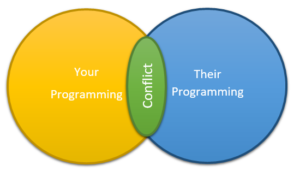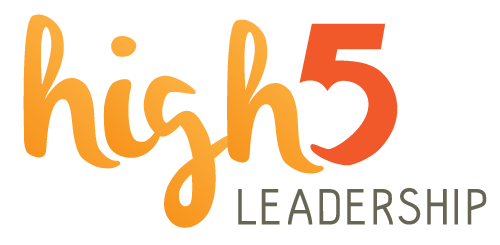22 Jul What if You Didn’t Have to be Right?
Thank you to High5 team member, Chad Snead, for this great insight!
Today I’m taking the opportunity to write about something we all experience in the workplace, and many of us even work to avoid it – conflict. I’m sure everyone is familiar with conflict in the workplace. You experience conflict over differing opinions, over unmet expectations, over deadlines, and so much more. Today, my focus is on conflict over differing opinions.
Imagine if you will, all the experiences you have had during your life and all of the lessons you have learned. For the purpose of this conversation, we will call the sum of those learnings and experiences your programming. Just as a computer’s programming determines how we interact with it, your programming determines how you interact with the world. Now, imagine everyone in this world also has their own programming that makes up their experiences and learnings. In the context of this conversation, there are 7.5 billion people on this planet, and not one of them has programming that looks like yours.
I’m sure you will agree that there are lots of opinions in this world and very few facts. Yet, most of us treat our opinions as if they were facts, and what happens when two individuals have differing opinions is that they often right fight, fight to be right, over which opinion is correct. Below is a diagram illustrating this idea.

Looking at it from this perspective starts to make a whole lot of things make sense doesn’t it? Have you ever found yourself questioning why someone was doing something a certain way. You may have asked yourself, “Why are they doing that. Don’t they have any common sense?” Have you ever wondered why common sense is so uncommon? Now you have the answer! It’s because their common sense doesn’t look like your common sense. They are coming from their own programming, just like you, which defines how they interact with the world.
Let’s bring this idea back to the workplace. Imagine you have 10 individuals in a conference room for a project planning meeting, a common occurrence for many people. I’m sure you have been in lots of meetings like this where disagreements were had and it took effort to come to a consensus. Well, now you have an idea of why – every single person in the meeting has their own programming and none of it looks alike. Everyone is coming from a different perspective.
The question at hand is what do you do when those situations occur? Are you the one overpowering others and working to get everyone to agree with your vision? Are you the voice that is being overpowered? How often are you willing to listen and go with someone else’s idea over your own? What did it take to get you there? What if you didn’t have to be right?
In our example of 10 people in a meeting there are 10 different ideas for any situation that comes up. That’s 10 ideas that everyone feels will get to the ultimate goal in the end. What makes one idea more correct then the others? Tradition, experience, procedures, standards, money, and time are all common reasons to use for why one idea is better than all the others being presented. However, there’s another way to look at those reasons. They are barriers.
All of those barriers are limiting our approaches to situations. What would be possible if we started letting that stuff go? Imagine how many ideas are being left on the table because we choose to let all those barriers stand in the way. One of the most popular barriers is tradition i.e. that’s just the way things are done. How many ideas are being ignored because that’s just the way things are done? What could be possible if you opened up to new ideas? What if you didn’t have to be right?
The next time you are in one of these situations practice doing the opposite of what you would normally do. If you are the one who is first to speak and works to bring everyone to your thinking, sit back and let others share their ideas. Internalize those ideas and consider them. You will likely be surprised at some of the ideas that will come out that never would have occurred to you. If you are normally the one sitting in the back holding in your ideas because you think no one will like them, share them. Get up! Let your voice be heard and create a new possibility.
What could be possible if you channeled some of that energy you spend on defending your truths into listening and being open to other people’s truths? What new things could you learn? What would become available to you? What if you didn’t have to be right?


